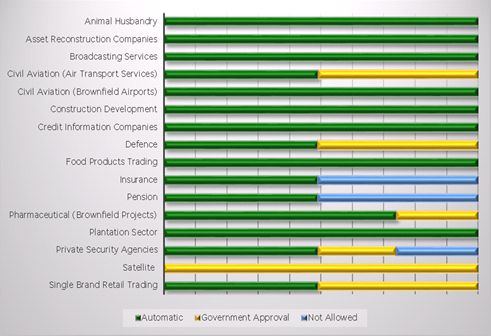- within Strategy, Privacy and Real Estate and Construction topic(s)
- with readers working within the Law Firm industries
On 20 June 2016, the Prime Minister's Office issued a press release announcing the decision of the Government of India to introduce amendments to the Foreign Direct Investment (FDI) Policy, with the intent of further liberalising FDI in nine sectors. With a series of liberalisations in the past few years, FDI in India in most sectors is now under the automatic route.
Key Announcements
| Sr No. | Sector | Previous Position | Change | Key Considerations |
| 1. | Food Products | Investment in the sector was nuanced and lacked clarity. | FDI permitted up to 100% under government approval route would now be permissible in trading, including through e-commerce, of food products manufactured or produced in India. | The liberalisation will enable global retail chains to set up 'food only' retail stores in India, or otherwise permit Indian 'food only' retail stores to access foreign funds. This is a significant relaxation of FDI in retail trading policy of the country. |
| 2. | Defence | FDI was permitted up to 49% under automatic route, and above through approval route on case to case basis wherever it was likely to result in access to modern and 'state-of-art' technology in India. | FDI permitted up to 100%
(up to 49% under automatic route, beyond which through government
approval, however, without the condition of 'state of art'
technology. Government can now grant approval in cases resulting in
access to modern technology in India or
'for other reasons as may be
recorded'. The new limit is also applicable to manufacturing of small arms and ammunitions under (Indian) Arms Act 1959. |
The absence of a clear definition of 'state of art' technology had resulted in uncertainty amongst prospective Investors. This change could lead to level playing field among domestic manufacturers and global original equipment manufacturers. |
| 3. | Broadcasting Carriage Services | FDI was permitted up to 49% under automatic route, beyond which with government approval. | FDI up to 100% under automatic route is now permitted in broadcast carriage services, viz. teleports, direct to home, cable networks, mobile TV and head end in the sky broadcasting services. | Although this change
would certainly create more investment opportunities, the following
could be roadblocks to such investments:
|
| 4. | Pharmaceutical | No brownfield investment was permitted without government approval. | FDI in brownfield pharmaceutical projects up to 74% is now permitted under automatic route. Investment beyond this threshold would require government approval. | This is a significant
move that will benefit financial investors and promote joint
ventures in India's buoyant pharmaceutical industry. However,
the following issues still require clarification:
|
| 5. | Civil Aviation | FDI under automatic
route was permitted up to 100% in greenfield projects, and up to
74% in brownfield projects (beyond which with government
approval). FDI was limited to 49% in scheduled air transport service / domestic scheduled passenger airlines. |
|
The press release clarifies that foreign airlines can continue to invest only up to 49% in Indian companies operating scheduled and non-scheduled air transport services, subject to conditions laid down in the extant FDI Policy. Such restriction could limit the investment opportunities in the sector. |
| 6. | Private Security Agencies | FDI under government route was permitted up to 49%. | FDI up to 49% would now be permissible under the automatic route and FDI beyond 49% but up to 76% will now be permissible under the government approval route. | This change would need
to be incorporated in the (Indian) Private Security Agencies
(Regulation) Act 2005 by way of an amendment. Government should also clarify ambiguity surrounding inclusion of companies providing cash logistics or cash management within the meaning of private security agencies. |
| 7. | Establishment of Branch Office, Liaison Office or Project Office | Prior approval of Reserve Bank of India or separate security clearance will no longer be required in the event that the principal business of the entity establishing a branch office, liaison office or project office is defence, telecom, private security or information technology, in cases where government approval or license/permission from the concerned ministry/ regulator has been obtained. | ||
| 8. | Animal Husbandry | FDI up to 100% was permissible in animal husbandry provided that such activity was undertaken under 'controlled conditions'. | The requirement of conducting the business under 'controlled conditions' has now been done away with. | |
| 9. | Single Brand Retail Trading | This sector entailed much debated local sourcing norms. | Local sourcing norms have now been relaxed for 3 years and relaxed sourcing regime for another 5 years has now been provided for entities engaged in single brand retail trading of products with 'state-of-art' and 'cutting edge' technology | The amendments will
encourage foreign technology brands to enter India. However, the
following clarifications may help the investment environment:
|
Liberalisation in the Past 2 Years
The liberalisations proposed by the press release are a part of a series of FDI policy reforms brought about by the Government of India in various sectors in the past two years. Some of sectors that have been liberalised in the past 2 years since Modi Government came into power, either by increasing the sectoral caps or by relaxation of investment conditions, are:

Closed Sectors
Certain sectors in which FDI cannot be made except through the government approval route are:
- Broadcast Content Services (FM Radio and Uplinking of News and Current Affairs TV Channels) – FDI up to 49% permissible with government approval;
- Print Media (Publishing of newspapers, periodicals and Indian editions of foreign magazines, dealing with news and current affairs) - FDI up to 26% permissible with government approval;
- Print Media (Publishing of scientific and technical magazines, specialty journals and periodicals, and publication of facsimile editions of foreign newspaper) - FDI up to 26% permissible with government approval;
- Satellite (Establishment and Operation) - FDI up to 100% permissible with government approval;
- Multi Brand Retail Trading - FDI up to 49% permissible with government approval; and
- Banking (Public Sector) - FDI up to 20% permissible with government approval.
Comment
The liberalisations announced by the press release are a step in the right direction and will boost the initiatives of the Government of India for ease of doing business, and making India an increasingly attractive destination for foreign investors. The Government of India is expected to soon issue legislative amendments as per the policy decisions announced in the press release.
The content of this document do not necessarily reflect the views/position of Khaitan & Co but remain solely those of the author(s). For any further queries or follow up please contact Khaitan & Co at legalalerts@khaitanco.com



